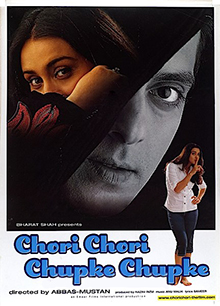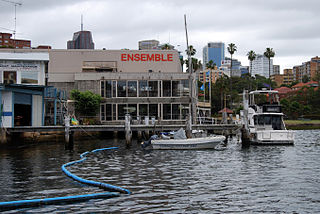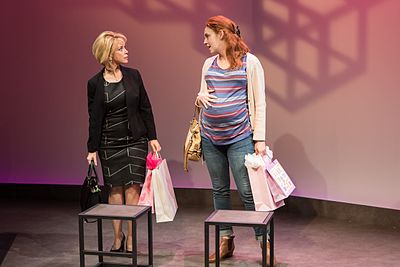Baby M was the pseudonym used in the case In re Baby M, 537 A.2d 1227, 109 N.J. 396 for the infant whose legal parentage was in question.

Chori Chori Chupke Chupke is a 2001 Indian Hindi-language romantic drama film directed by Abbas–Mustan, with screenplay and story from Javed Siddiqui and Neeraj Vora respectively. Starring Salman Khan, Rani Mukerji and Preity Zinta in lead roles, the film's music is composed by Anu Malik and lyrics are penned by Sameer. Telling the story of a married couple hiring a young prostitute as a surrogate mother, the film generated controversy during its release for dealing with the taboo issue of surrogate childbirth in India.

Surrogacy is an adoption arrangement, often supported by a legal agreement, whereby a woman agrees to childbirth on behalf of another person(s) who will become the child's parent(s) after birth. People pursue surrogacy for a variety of reasons such as infertility, dangers or undesirable factors of pregnancy, or when pregnancy is a medical impossibility.
Third-party reproduction or donor-assisted reproduction is any human reproduction in which DNA or gestation is provided by a third party or donor other than the one or two parents who will raise the resulting child. This goes beyond the traditional father–mother model, and the third party's involvement is limited to the reproductive process and does not extend into the raising of the child. Third-party reproduction is used by couples unable to reproduce by traditional means, by same-sex couples, and by men and women without a partner. Where donor gametes are provided by a donor, the donor will be a biological parent of the resulting child, but in third party reproduction, he or she will not be the caring parent.
10 Days on the Island is a biennial cultural festival held in the island state of Tasmania, Australia.
The main family law of Japan is Part IV of Civil Code. The Family Register Act contains provisions relating to the family register and notifications to the public office.
Nadia Tass is an Australian theatre director and film director and producer. She is known for the films Malcolm (1986) and The Big Steal (1990), as well as an extensive body of work in the theatre, both in Australia and internationally.

The Ensemble Theatre is an Australian theatre company and theatre, situated in the Sydney suburb of Kirribilli, New South Wales.
Danielle Carter is an Australian actress. She has acted in a number of popular television shows, films and plays.
Fertility tourism is the practice of traveling to another country or jurisdiction for fertility treatment, and may be regarded as a form of medical tourism. A person who can become pregnant is considered to have fertility issues if they are unable to have a clinical pregnancy after 12 months of unprotected intercourse. Infertility, or the inability to get pregnant, affects about 8-12% of couples looking to conceive or 186 million people globally. In some places, rates of infertility surpass the global average and can go up to 30% depending on the country. Areas with lack of resources, such as assisted reproductive technologies (ARTs), tend to correlate with the highest rates of infertility.
Surrogacy in India and Indian surrogates became increasingly popular amongst intended parents in industrialised nations because of the relatively low costs and easy access offered by Indian surrogacy agencies. Clinics charged patients between $10,000 and $28,000 for the complete package, including fertilization, the surrogate's fee, and delivery of the baby at a hospital. Including the costs of flight tickets, medical procedures and hotels, this represented roughly a third of the price of the procedure in the UK and a fifth of that in the US. Surrogate mothers received medical, nutritional and overall health care through surrogacy agreements.

A.G.R. v. D.R.H & S.H. is a ruling by the Superior Court of New Jersey, Hudson County Vicinage, and is the first precedent regarding gestational surrogacy in New Jersey. The ruling was handed down by Judge Francis Schultz on December 23, 2009.

The legal aspects of surrogacy in any particular jurisdiction tend to hinge on a few central questions:

Agape International Missions (AIM) is a nonprofit, non-denominational, non-governmental organization working to rescue, heal and empower survivors of sex trafficking in Cambodia. It has staff in California and Southeast Asia and carries out housing, education, health, employment, rehabilitation, and community care initiatives in Cambodia. The AIM Apparel is a retail site that sells jewelry and other products made by survivors and supports the organization's initiatives. AIM received GuideStar USA, Inc.'s gold seal of transparency in 2019. Charity Navigator gave AIM the highest rating of 4 out of 4 stars and a score of 100 out of 100 for accountability & transparency.
The Akanksha Infertility Clinic is a women's health centre located in Anand, Gujarat, India, and headed by Dr Nayna Patel. The clinic was founded in 1999, and was originally focused on In Vitro Fertilization. India declared commercial surrogacy legal in 2002; however the clinic did not begin to do surrogacy until 2004. Patel, who appeared on Oprah Winfrey's talk show in 2007, has produced more than 1000 surrogate babies as of October 2015.
Commodification of the womb is a Marxist concept related to the sale of functions performed by the human uterus.
In July 2014, a Thai woman, Pattaramon Chanbua, hired as a surrogate mother by an Australian couple, David John Farnell and Wenyu Wendy Li, sought to raise money for her critically-ill surrogate son, Gammy. The infant had been in her care since December 2013, when the biological parents, Farnell and Li, had left Thailand with baby Gammy's twin sister Pipah.
Surrogacy is legal in Canada provided that it is altruistic (unpaid). The Assisted Human Reproduction Act of 2004 criminalizes commercial surrogacy. The validity of surrogacy contracts and the process for establishing parenthood of the child is governed by provincial law. Quebec law did not recognize surrogacy contracts from 1994 to 2023, and continues to regulate them more strictly, whereas British Columbia has the most permissive laws governing surrogacy. Provinces also vary in the degree to which they compensate surrogacy expenses, such as IVF procedures.
Circle Surrogacy is a US-based surrogacy agency headquartered in Boston, Massachusetts. Circle Surrogacy carries an audited success rate for intended parents having a baby at 99.3%.
Gabrielle Scawthorn is an Australian actress. She has appeared in numerous stage productions as well as TV and film. Gabrielle grew up in Ipswich, Queensland. She trained at NIDA.









